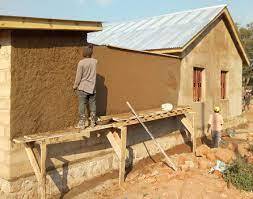BUILD A ROOF INITIATIVE. ESTIMATED COSTS FOR 1 HOUSE

Creating a project budget for the "Build a Roof" initiative involves several key components, ranging from materials and labor to logistics and administration. Here’s a sample budget breakdown for a single housing construction project focused on building roofs for disadvantaged communities in the Kilimanjaro region of Tanzania.
Sample Project Budget for "Build a Roof" Initiative
Expense Category: Details Estimated Costs in (USD)
1. Materials
Roof Materials Metal sheets, timber, nails, insulation, etc. $3,000. Construction Supplies Tools, equipment rental, safety gear, etc. $1,000. Subtotal Materials: $4,000
2. Labor Costs:
Skilled Labor, Local craftsmen and builders (wages) $2,500- Community Labor Volunteer labor (incentives, training) $500 Subtotal Labor: $3,000
3. Logistics & Travel
Transportation: Travel costs for supplies and labor $600- Accommodations Lodging for workers for the project $1,200 Subtotal Logistics: $1,800
4. Community EngagementWorkshops and Training: Educational workshops for locals $500- Outreach Programs Community meetings and promotional materials $200 Subtotal Engagement: $700
5. Administrative Costs.
Coordination & Management: Project coordination and fees $800- Office Supplies Printing, communications, etc. $300 Subtotal Admin Costs: $1,100
6. Contingency Fund: 10% of total budget for unforeseen costs $1,060
Subtotal Contingency: $1,060
TOTAL PROJECT BUDGET: $12,660
Important Notes:
Materials Costs: This includes everything necessary for building roofs, such as metal sheets, wooden frames, and fasteners. It may vary based on local prices and availability.
Labor Costs: Incorporating skilled labor is essential to ensure that roofs are installed properly and safely.
Logistics & Travel: This component covers the costs of transporting materials to the site, as well as accommodations for Laborers during their working period.
Community Engagement: Workshops help empower the local community with knowledge and skills that can benefit them long-term, even after the project is completed.
Administrative Costs: These cover necessary administrative expenses to keep the initiative running smoothly.
Contingency Fund: It’s essential to have a contingency fund to manage any unexpected expenses that may arise during the project.
Fundraising Considerations we rely on:
Donations from local businesses, Donors, and international organizations
We are a nonprofit initiative focused on housing and community development
Partnering with other organizations and NGOs for resource sharing
This budget is adjustable based on specific project requirements, and local cost fluctuations should always be considered. Collaboration and support from volunteers and community members can also influence overall costs while enhancing community ownership of the initiative.